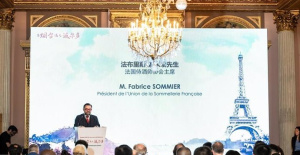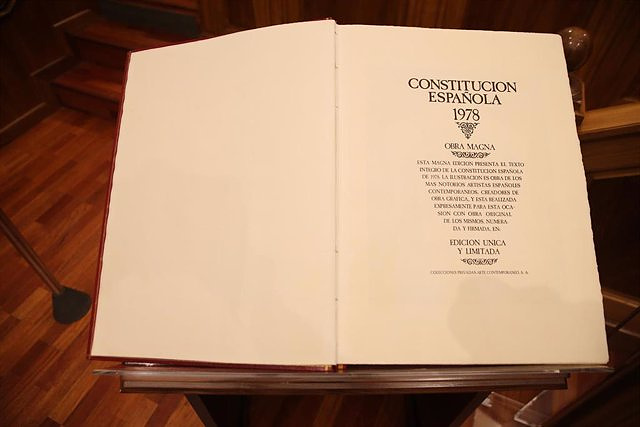And also for taking too long to order the return to Hungary of a girl brought to Mallorca by her mother without informing her father
MADRID, 8 Nov. (EUROPA PRESS) -
The European Court of Human Rights (ECHR) has considered that Spain violated the right to freedom of expression of a soldier whom the Ministry of Defense did not sanction but did warn him that he had exceeded the limits by criticizing in a television program television the "spurious and bastard" origins of the Transition and the Constitution, which he described as a farce.
For the court based in Strasbourg (France), the warning itself "could have an impact on the exercise of their freedom of expression and even have a paralyzing effect."
Thus, in a sentence to which Europa Press has had access, the ECHR has condemned Spain to compensate the plaintiff, Miguel Ayuso, with 8,000 euros and has also indicated that the Spanish courts did not take into account what throughout the process his status as a university professor of law.
In his television intervention, which took place in May 2013, the plaintiff expressed his opinion on the Transition process from the dictatorship to democracy, assuring that the origins of the Constitution were flawed and qualifying the Magna Carta as a "pseudo- constitution", a way of thinking that had already been embodied in academic articles, according to the ECHR ruling.
When the program was broadcast, the plaintiff was not yet in a reserve situation, he was an auditor lieutenant colonel and was presented to viewers as a member of the Military Legal Corps, a university professor of Law and an honorary doctorate.
As a result of his comments, a disciplinary process was opened against him that determined that he had exceeded his freedom of expression and that he would be punished if he made statements of this type again. the instructor
The plaintiff went to the ECHR to denounce that, although no sanction had been imposed on him, the decision adopted in the disciplinary proceedings had established that he had exceeded the limits of his right to freedom of expression.
However, the Central Military Court later declared that these statements were not in themselves an attack on the Constitution, but had been made in public debate and in academia.
Strasbourg has now determined that the disciplinary bodies' pronouncements that their views were not protected by the right to freedom of expression "constituted a sufficient reprimand for an opinion expressed in the course of an academic debate and on a matter of general interest." ".
The European judges stress that the soldier was warned to "censor his future behavior and his statements regarding the Constitution, regardless of the context or intention, and could lead to a sanction", although it was not put.
In a second sentence made public today, the ECHR has imposed on Spain to pay 24,000 euros to a Hungarian citizen for the delay of the Spanish courts in ordering the return to Hungary of his daughter, whom his ex-wife had taken to Mallorca waiting of the final decision on which of the two belonged to the custody.
Here, Strasbourg has ruled on Spain's actions in the legal dispute between the applicant and his ex-wife over the custody of the daughter, after the woman moved to Spain with the minor in 2015, when she was eight years old, without informing the dad.
When he arrived in Spain with the girl, the mother denounced the father for gender violence and threats. Initially, a court in Palma de Mallorca issued a restraining order against the plaintiff, a measure that was annulled a year later for lack of evidence.
The plaintiff requested the Hungarian Justice that his daughter be returned to Hungary, the order was granted and Spain agreed to it, but after a "long procedure" before being carried out.
For the judges, regardless of the fact that the Hungarian courts have finally given the mother custody of the girl, there was an "excessive duration" in the process of recognition and execution of the return order by Spain that "had serious consequences for the relationship between the girl and the applicant".
"The excessive duration of the procedure in Spain not only affected the relationship between the applicant and his daughter by interrupting it for two years, but also affected the decision of the Hungarian courts to finally grant custody of the girl to her mother, since that they found that the passage of time had strengthened the ties between the girl and her mother and weakened those of the father," she says.
On the other hand, Strasbourg has agreed with the State in a lawsuit filed by the company Marina Aucanada Group S.L. for a judicial process on a public tender for the management of moorings in the dock of the Old Port of Alcúdia (Majorca).
The plaintiff submitted an offer and was selected as the most advantageous, but the courts ruled in favor of the City Council and declared the contest void in a judicial process of which, according to the company's arguments before the ECHR, it had not been notified.
According to the judges, the plaintiff company was aware of the procedure in question and its lack of participation "was due to a lack of diligence on its part" and not that of the authorities.
"The authorities, by informing all potentially affected persons through public notification of the judicial administrative procedures initiated by the City Council to cancel the tender, provided the company with a reasonable opportunity to become aware of the procedures," he concludes.

 Exploring Cardano: Inner Workings and Advantages of this Cryptocurrency
Exploring Cardano: Inner Workings and Advantages of this Cryptocurrency Seville.- Economy.- Innova.- STSA inaugurates its new painting and sealing hangar in San Pablo, for 18 million
Seville.- Economy.- Innova.- STSA inaugurates its new painting and sealing hangar in San Pablo, for 18 million Innova.- More than 300 volunteers join the Andalucía Compromiso Digital network in one month to facilitate access to ICT
Innova.- More than 300 volunteers join the Andalucía Compromiso Digital network in one month to facilitate access to ICT Innova.-AMP.- Ayesa acquires 51% of Sadiel, which will create new technological engineering products and expand markets
Innova.-AMP.- Ayesa acquires 51% of Sadiel, which will create new technological engineering products and expand markets Study identifies new genetic form of Alzheimer's
Study identifies new genetic form of Alzheimer's Judge Juan Merchan fines Trump for contempt of court in 'Stormy Daniels' bribery case
Judge Juan Merchan fines Trump for contempt of court in 'Stormy Daniels' bribery case The Ibex 35 rises 0.58% at closing thanks to the boost from Indra and Grifols
The Ibex 35 rises 0.58% at closing thanks to the boost from Indra and Grifols STATEMENT: Yantai Holds “When Yantai Met Bordeaux” Wine Gift Box Launch Event
STATEMENT: Yantai Holds “When Yantai Met Bordeaux” Wine Gift Box Launch Event How Blockchain in being used to shape the future
How Blockchain in being used to shape the future Not just BTC and ETH: Here Are Some More Interesting Coins Worth Focusing on
Not just BTC and ETH: Here Are Some More Interesting Coins Worth Focusing on UMH researchers are working on a high-quality apricot crop that requires less irrigation water
UMH researchers are working on a high-quality apricot crop that requires less irrigation water The UPV develops an application to improve the quality of life of patients with glioblastoma
The UPV develops an application to improve the quality of life of patients with glioblastoma A sensor system obtains the fingerprint of essential oils and detects if they have been adulterated
A sensor system obtains the fingerprint of essential oils and detects if they have been adulterated Faraday UPV presents the 'Origin' rocket to exceed 10 km of flight: "It is the beginning of the journey to space"
Faraday UPV presents the 'Origin' rocket to exceed 10 km of flight: "It is the beginning of the journey to space" A million people demonstrate in France against Macron's pension reform
A million people demonstrate in France against Macron's pension reform Russia launches several missiles against "critical infrastructure" in the city of Zaporizhia
Russia launches several missiles against "critical infrastructure" in the city of Zaporizhia A "procession" remembers the dead of the Calabria shipwreck as bodies continue to wash up on the shore
A "procession" remembers the dead of the Calabria shipwreck as bodies continue to wash up on the shore Prison sentences handed down for three prominent Hong Kong pro-democracy activists
Prison sentences handed down for three prominent Hong Kong pro-democracy activists ETH continues to leave trading platforms, Ethereum balance on exchanges lowest in 3 years
ETH continues to leave trading platforms, Ethereum balance on exchanges lowest in 3 years Investors invest $450 million in Consensys, Ethereum incubator now valued at $7 billion
Investors invest $450 million in Consensys, Ethereum incubator now valued at $7 billion Alchemy Integrates Ethereum L2 Product Starknet to Enhance Web3 Scalability at a Price 100x Lower Than L1 Fees
Alchemy Integrates Ethereum L2 Product Starknet to Enhance Web3 Scalability at a Price 100x Lower Than L1 Fees Mining Report: Bitcoin's Electricity Consumption Declines by 25% in Q1 2022
Mining Report: Bitcoin's Electricity Consumption Declines by 25% in Q1 2022 Oil-to-Bitcoin Mining Firm Crusoe Energy Systems Raised $505 Million
Oil-to-Bitcoin Mining Firm Crusoe Energy Systems Raised $505 Million Microbt reveals the latest Bitcoin mining rigs -- Machines produce up to 126 TH/s with custom 5nm chip design
Microbt reveals the latest Bitcoin mining rigs -- Machines produce up to 126 TH/s with custom 5nm chip design Bitcoin's Mining Difficulty Hits a Lifetime High, With More Than 90% of BTC Supply Issued
Bitcoin's Mining Difficulty Hits a Lifetime High, With More Than 90% of BTC Supply Issued The Biggest Movers are Near, EOS, and RUNE during Friday's Selloff
The Biggest Movers are Near, EOS, and RUNE during Friday's Selloff Global Markets Spooked by a Hawkish Fed and Covid, Stocks and Crypto Gain After Musk Buys Twitter
Global Markets Spooked by a Hawkish Fed and Covid, Stocks and Crypto Gain After Musk Buys Twitter Bitso to offset carbon emissions from the Trading Platform's ERC20, ETH, and BTC Transactions
Bitso to offset carbon emissions from the Trading Platform's ERC20, ETH, and BTC Transactions Draftkings Announces 2022 College Hoops NFT Selection for March Madness
Draftkings Announces 2022 College Hoops NFT Selection for March Madness
























